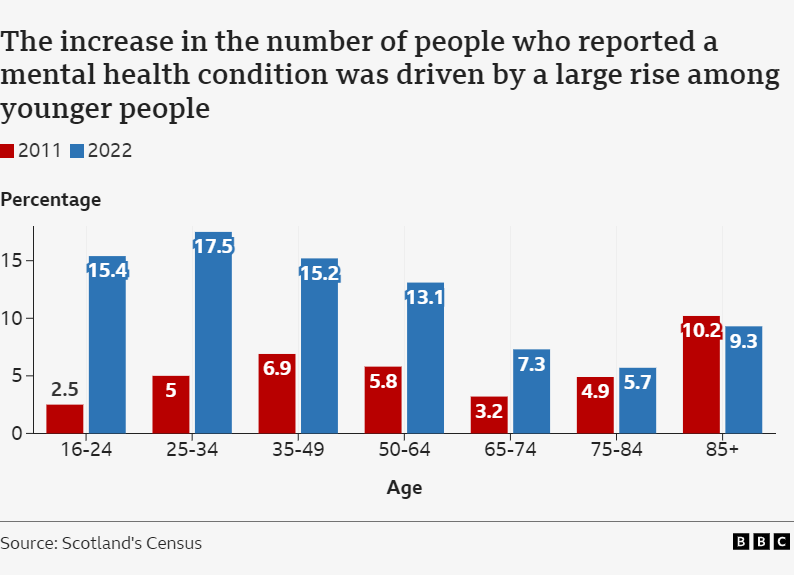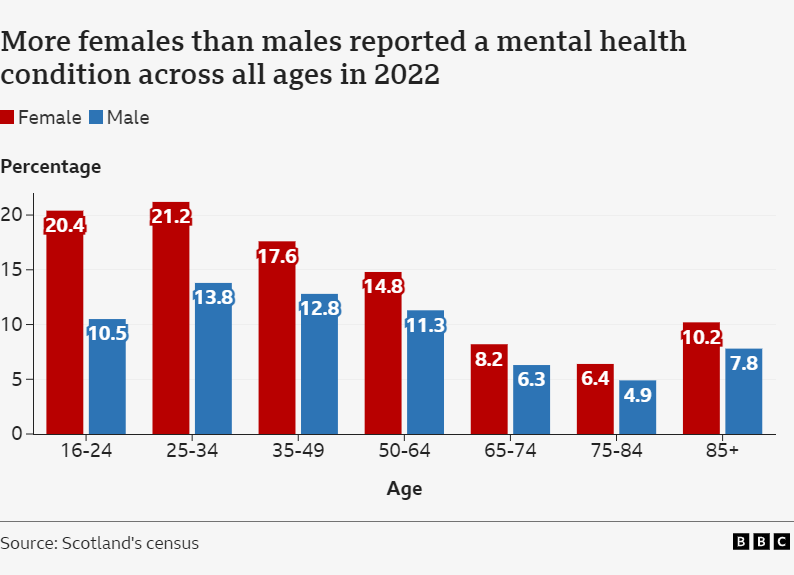Young people most likely to have poor mental health

Young women were most likely to report mental health conditions
- Published
The number of people in Scotland who say they have a mental health condition has doubled over the past decade - with young people most likely to be affected.
Data from the 2022 Census showed that 11.3% of the population - about one in nine people - reported a condition that affected their mental wellbeing.
This increase from 232,900 people to 617,100 was the biggest rise across a range of health conditions in the census.
The statistics revealed it was now more common for younger people to report a mental health condition than older age groups - the reverse of the 2011 results.

Among 16 to 24 year olds the figure was 15.4% - with females (20.4%) twice as likely as males to report a mental health condition.
The results were even worse for the 25 to 34 age group, where 17.5% reported a mental health condition, with the figure rising to 21.2% for women.

The 2022 census took place after two years of disruption and lockdowns caused by the Covid pandemic which other surveys have shown affected mental health conditions.
The latest census report said that the results may reflect people’s willingness to report their health condition as well as changes in prevalence.
For specific conditions such as depression, anxiety and self-harm there have been clear increases in reporting throughout the last decade
Increases in demand for services may be partially driven by decreased stigma and more awareness about mental health and wellbeing, the report said.
Alex Cumming, the executive director of operations at Scottish Action for Mental Health, said the census data aligned with what the charity had been seeing and responding to in recent years.
He added: "The mental health system is under significant pressure - waiting times are still high, and that’s in large part about the increase in demand demonstrated by these figures.
“More positively, we also know that many people are more comfortable talking about their mental health now than they were in 2011.
"We need to make sure that these people can ask once and get help fast, which means improving access to community and preventative support before smaller problems become bigger problems."
Bad health
The Scottish government's mental wellbeing minister, Maree Todd, said the survey results showed that "people feel more able to come forward and talk about their mental health than they were in 2011, which I hope is a welcome sign that stigma is decreasing."
She said: “They also demonstrate why it is important that the right help and support is available for all those in need. We have ensured access to counselling services in all secondary schools as well as trusted online advice.”
Other census results showed that, after accounting for age, 6.8% of the population said they were in bad or very bad health in 2022 - up from 5.9% in 2011.
The census found that the Glasgow City council area had the highest percentage of people reporting bad or very bad health at 10.8% while Aberdeenshire had the lowest at 4.2%.
Comparable figures for England and Wales show 5.4% of people reported bad or very bad health in the 2021 census, while in Northern Ireland it was 8.2% of people.
The census also recorded 627,700 people providing unpaid care, a 27.5% increase on the numbers at the previous census in 2011.
Most unpaid carers are aged 50 or over and 58.8% are female.